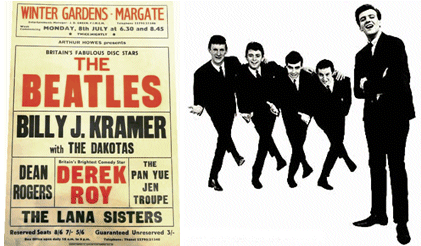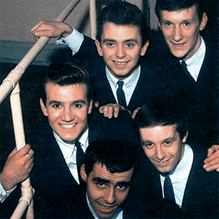Sixties
City presents
a wide-ranging series of
articles on all aspects of the Sixties, penned by the creator of the iconic
60s music paper Mersey
Beat
|
Sixties
City presents
a wide-ranging series of
articles on all aspects of the Sixties, penned by the creator of the iconic
60s music paper Mersey
Beat
|
|||||
|
 |
Billy,
whose real name is William Howard Ashton, was born in Bootle, Liverpool,
on August 19th 1943. His original band in 1960 was the Sandstormers,
who changed their name to become Billy Forde & The Phantoms, then Billy
Kramer & The Coasters. The line-up was Billy on guitar and vocals, Arthur
Ashton on lead, Ray Dougherty on rhythm, Tony Sanders on drums and George
Braithwaite on bass. I was discussing his career with Billy and he told
me "My first group was called The Phantoms and the lead singer was called
Bruce. We used to rehearse in the ODVA club, round the corner from where
we lived, and were booked to appear there on Saturday nights. "It was
the same old story at first: ten people playing dominoes. Then we started
bringing in the people until there were queues outside the club. Bruce
finished his apprenticeship as a hairdresser and said he'd have to leave
to start his own business".
"My cousin Arthur was arranging the bookings and, when my guitar was stolen during an appearance at the Conservative Club in Green Lane, he talked me into singing with the band. We were doing a lot of 'auditions' at the time. These were gigs in Liverpool where the promoter didn't have to pay for an attraction. There were so many groups looking for work he'd insist that you play an 'audition' first, in front of an audience, before he'd give you any bookings. Fortunately, we went down well at the David Lewis and were given a dozen bookings there." Billy vividly remembers his first realisation that The Beatles were something special: "The first time I heard of them was when they played at Litherland Town Hall. I remember Cliff Roberts and The Rockers were on at the time, but the only group who knocked me out were Kingsize Taylor and The Dominoes. I was a group freak. Bob Wooler, the compere, announced that the next week they would be presenting a group just back from Hamburg: The Beatles. I stopped in my tracks, I thought 'I must go and see them'." "The Beatles had Chas Newby playing bass on that occasion. McCartney had a black and green Rosetti guitar, Lennon had a Rickenbacker and George had a Gretsch. That was during the time when guitars were displayed in glass cases, not just hung up on the walls like they are today. I remember going into Rushworth's and being awed by the guitars in the cases. When my band The Coasters had been given an audition by promoter Brian Kelly at Aintree Institute, the venue opposite the Coronation pub in Linacre Lane, we had to travel to the gig by 61 bus, me, the boys and all our gear". " That was when I had my first meeting with Lennon. He was just lounging about in the dressing room and I asked him about his Rickenbacker guitar and he let me have a go on it. I'd seen the Fender guitar and the Gibson and the Gretsch, but I hadn't seen a Rickenbacker. The fact that he had one must have put him on the market. Paul was there with his Rosetti, unplugged and with strings missing!. I also remember them on the Bluegenes night at the Cavern. They'd come back from Hamburg and Stu had left. I was freaked out by the whole band when I saw them at the Cavern. McCartney, Lennon, Harrison and Pete Best. McCartney was playing bass and they were into leather. It was a lot slicker, the space between numbers had been tightened up a lot and the vocal backings and everything, the whole thing flowed better. They had a restricted repertoire, but I realised that Lennon and McCartney had character". Billy was actually about to leave The Coasters and take up a full time post with British Rail at Rugby. He'd been down to Rugby to discuss his new job and his parents had agreed that he should take it. His then manager Ted Knibbs called him and arranged to meet him in Liverpool. He was very mysterious about it: "I had no idea what Ted had in mind. I was about to tell him I was packing it all in. He took me to NEMS, introduced me to Brian Epstein and Brian said he wanted to manage me. I was so knocked out I completely lost my appetite for remaining with British Rail". "Shortly afterwards I was called into a meeting with Brian at his office and John Lennon was there. Brian said to me: "John's come up with an idea. He thinks your name would sound much better if we added the initial 'J' to it. How does Billy J. Kramer sound?" "I said: 'That's okay by me, but what do I say to the press if they ask me what the 'J' stands for?" "John said 'You can tell them it stands for Julian.' "To tell you the truth, I didnít like the name Julian and I refused to use it. I didn't know at the time that John had a son and had named him Julian in memory of his mother". |
 |
When Ted Knibbs originally approached Epstein, it was to manage Billy Kramer
and The Coasters, but The Coasters refused to turn professional. Brian had
to find another backing group for Billy. Liverpoolís leading instrumental
group, The Remo Four, turned him down, so he made an offer to the Manchester
band The Dakotas, who were backing singer Pete MacLaine at the time. They initially refused, but finally agreed when Epstein arranged for them to make records in their own right. Considering that Billy only teamed up with The Dakotas in 1963, their American press release in 1964 read: 'Billy and The Dakotas chose their name when they were called to audition in England four years ago. They were told to return dressed as Indians. Unable to afford the $100 apiece for buckskins, the group skipped the audition but kept the name'. Billy topped the British charts with his first release, the Lennon & McCartney number 'Do You Want To Know A Secret?' His other Lennon & McCartney hits included 'Bad To Me', 'I'll Keep You Satisfied' and 'From A Window'. It was Kramer himself who found the number 'Little Children' and had to talk Brian Epstein into letting him record it. The song became his biggest hit. Epstein seemed to have lost interest in Billy's career by this time, so the singer approached Paul McCartney to ask him if he could provide him with a song. Paul offered him 'Yesterday', but Billy didn't consider it suitable. One Lennon & McCartney number which Billy recorded has never been released. It's called 'One And One Is Two.' It was mainly written by Paul. Paul and John worked together on the number in their suite at the George V Hotel in Paris after a show at the Olympia Theatre. |
 |
|
Article
Text
UK
web hosting by
|